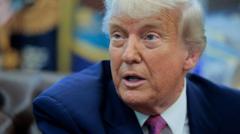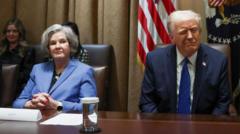In a striking statement during a recent press briefing, former President Donald Trump indicated he expects clarity from Russian President Vladimir Putin within two weeks regarding his intentions on the Ukraine conflict. As Russian attacks escalate, Trump expressed his growing frustration, assessing Putin's behavior in light of increased violence following their recent communications. Addressing reporters, Trump said, "I can't tell you that, but I'll let you know in about two weeks," setting the stage for an ultimatum as the Kremlin has ramped up assaults, resulting in significant casualties.
Trump Issues Ultimatum to Putin Amid Escalating Ukraine Crisis

Trump Issues Ultimatum to Putin Amid Escalating Ukraine Crisis
Former President Trump sets a two-week deadline for Putin to demonstrate his commitment to ending the ongoing conflict in Ukraine, heightening tensions as Russian attacks intensify.
His comments reflect heightened observations about Putin's strategic maneuvers, as devastating bombardments have affected countless civilians, particularly in Kyiv. Trump underscored the impending test of Putin's resolve, insinuating that a lack of progress could provoke a "different" American response.
Despite having previously communicated that his discussions with Putin went "very well," Trump appears skeptical after a recent call between the two leaders failed to yield substantial results, with a promised peace memorandum remaining unfulfilled. The situation on the ground remains dire, as reports indicate that the Russian military's sophisticated missile and drone assaults have wreaked havoc with rising fatalities.
Moreover, Trump's recent proclamations—including his remarks about Putin's mental state and his criticism of how the Biden administration has handled the situation—suggest a deepening dissatisfaction. Trump's assertion that Putin is "playing with fire" and "absolutely crazy," coupled with ongoing attacks, emphasizes a turning tide in discourse surrounding US and Russian relations.
As Trump navigates this geopolitical dynamic, new responses from the White House maintain that it has sustained pressure on Moscow through existing sanctions. Yet, prominent observers regard Trump's shifting demands and lack of concrete concessions from Russia as signs of the complexities he faces in influencing the course of this conflict. The war continues to claim lives and devastate regions, setting the stage for ongoing debates about international diplomacy and military aid for Ukraine.
As the situation unfolds, Ukraine's President Volodymyr Zelensky has voiced concerns over Moscow's attempts to delay peace discussions, while calls from various world leaders, including Germany's Chancellor, stress the need for more defensive capabilities for Ukraine amidst the conflict.
Despite having previously communicated that his discussions with Putin went "very well," Trump appears skeptical after a recent call between the two leaders failed to yield substantial results, with a promised peace memorandum remaining unfulfilled. The situation on the ground remains dire, as reports indicate that the Russian military's sophisticated missile and drone assaults have wreaked havoc with rising fatalities.
Moreover, Trump's recent proclamations—including his remarks about Putin's mental state and his criticism of how the Biden administration has handled the situation—suggest a deepening dissatisfaction. Trump's assertion that Putin is "playing with fire" and "absolutely crazy," coupled with ongoing attacks, emphasizes a turning tide in discourse surrounding US and Russian relations.
As Trump navigates this geopolitical dynamic, new responses from the White House maintain that it has sustained pressure on Moscow through existing sanctions. Yet, prominent observers regard Trump's shifting demands and lack of concrete concessions from Russia as signs of the complexities he faces in influencing the course of this conflict. The war continues to claim lives and devastate regions, setting the stage for ongoing debates about international diplomacy and military aid for Ukraine.
As the situation unfolds, Ukraine's President Volodymyr Zelensky has voiced concerns over Moscow's attempts to delay peace discussions, while calls from various world leaders, including Germany's Chancellor, stress the need for more defensive capabilities for Ukraine amidst the conflict.




















